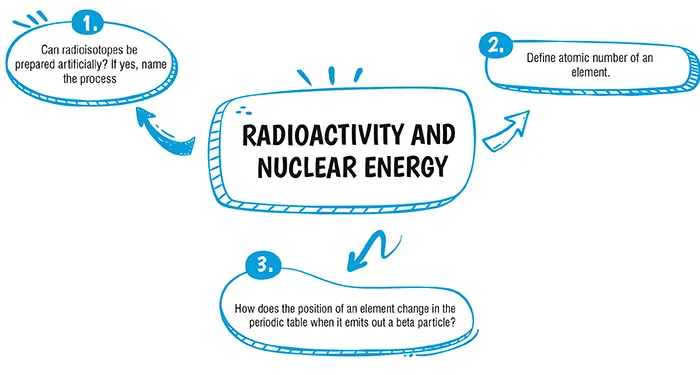.webp)
.webp)
Radioactivity refers to the spontaneous decay or disintegration of an unstable atomic nucleus, which results in the emission of radiation.Nuclear energy is the energy held in the nucleus of an atom. It can be released through nuclear reactions such as fission (splitting of atomic nuclei) or fusion (combining of atomic nuclei). For more information,Here you will find radioactivity class 10 icse important questions.
Radioactivity is a natural or induced phenomenon associated with certain elements and isotopes, nuclear energy harnesses the immense power locked within atomic nuclei for practical applications, especially energy production. Both have profound implications for science, technology, and society. It also touches on the uses of radioactive materials and the hazards associated with exposure to ionizing radiation. The chapter further explores nuclear energy generation principles and the working of nuclear reactors. It is a fundamental chapter with implications in energy production, healthcare, and nuclear research. If you want to prepare well and clear your understanding then below are some radioactivity class 10 ICSE important questions.
Radioactivity is the spontaneous emission of particles and/or radiation from the nucleus of an unstable atom. This process results in the atom transforming into a new element or a stable isotope of the same element. Nuclear energy is the energy stored in the nucleus of an atom, released either by splitting the nucleus apart (fission) or by fusing two small nuclei together (fusion). Nuclear energy can be harnessed to produce electricity, and it offers the advantage of producing large amounts of power with minimal greenhouse gas emissions. However, it also presents challenges, such as radioactive waste management and safety concerns. If you want to practice more questions and clear your understanding, then oswal.io provides you with class 10 Radioactivity and Nuclear Energy important questions and answers.

Ans. (d) All of these
Explanation:
All alpha, beta, gamma (γ) particles can be stopped by a lead box. Whereas, Alpha (a) and Beta (a) particles can easily be stopped by a paper and an aluminium sheet, respectively. But gamma rays are more penetrating and can be stopped only by lead box.
Ans. (a) Helium
Explanation:
Emission of alpha (α ) particle is alternatively referred as the emission of helium. Both alpha (α ) particle and helium has mass number of 4 and atomic number of 2.
Explanation:
Yes, radio isotopes can be prepared artificially by nuclear transmutation.Radioisotopes, also known as radioactive isotopes, are isotopes of an element that have unstable nuclei and emit radiation as they decay to more stable forms. Each radioisotope has a unique half-life, which is the time it takes for half of the substance to decay.
Explanation:
The number of protons in the nucleus is known as the atomic number of the element and is denoted by Z.The atomic number, often denoted asZ, is a fundamental property of an atom that defines its chemical identity.
Explanation:
When an element emits out a beta particle, a new element is formed with properties similar to those of an element one place later in the periodic table.


Nuclear energy represents the colossal power locked within the atomic nucleus. By either splitting heavy nuclei (fission) or combining lighter ones (fusion), vast amounts of energy can be released. This energy source offers a potent alternative to fossil fuels, promising substantial electricity generation with minimal greenhouse gas emissions. However, the challenges it poses, including radioactive waste management, safety concerns, and geopolitical implications, underscore the need for cautious and informed stewardship.This conclusion encapsulates the essence and implications of nuclear energy and radioactivity in our world. If you seek additional practice and a deeper comprehension of the topics covered in the chapter, oswal.io offers an extensive array of class 10 Radioactivity and Nuclear Energy important questions and answers to facilitate a more profound understanding of the concepts.
Ans: Radioactivity is the spontaneous emission of radiation, either directly from unstable atomic nuclei or as a result of a decay process.
Ans: Nuclear energy is produced by splitting (fission) heavy atomic nuclei like uranium or plutonium, or by fusing (fusion) light atomic nuclei such as hydrogen isotopes. These reactions release a large amount of energy.
Ans: No. While both deal with atomic nuclei, radioactivity refers to the spontaneous emission of radiation from unstable nuclei, whereas nuclear energy refers to the energy produced by manipulating atomic nuclei through fission or fusion.
Ans: Nuclear energy produces a large amount of electricity with minimal carbon emissions, which can help reduce greenhouse gases. It is also a reliable energy source that isn't affected by weather or seasonal variations like some renewables.
Ans: The primary concerns include potential nuclear accidents, the long-term storage of radioactive waste, and the potential misuse of nuclear technology or materials for weapons development.